
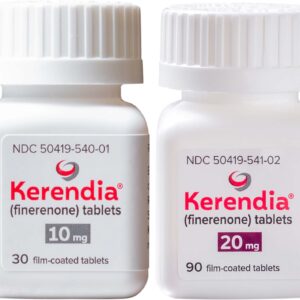
Buy Kerendia (finerenone) Online
From $634.70
Kerendia (finerenone) is a prescription medication used to treat adults with chronic kidney disease (CKD) associated with type 2 diabetes. Kerendia is a mineralocorticoid receptor antagonist (MRA), which means it works by blocking the effects of aldosterone, a hormone that can damage the kidneys, heart, and blood vessels.

Buy Kerendia (finerenone) Online
From $634.70
- Description
- Additional information
- Reviews (4)
Description
What is Kerendia (finerenone)?
Kerendia (finerenone) is a prescription medication used to treat adults with chronic kidney disease (CKD) associated with type 2 diabetes. Kerendia is a mineralocorticoid receptor antagonist (MRA), which means it works by blocking the effects of aldosterone, a hormone that can damage the kidneys, heart, and blood vessels.
Uses:
Kerendia is used to:
- Slow down the progression of CKD
- Reduce the risk of kidney failure
- Reduce the risk of cardiovascular death, heart attack, and hospitalization for heart failure
How to use:
Kerendia is taken orally once a day with food. The recommended starting dosage is 10 mg or 20 mg, depending on your estimated glomerular filtration rate (eGFR) and serum potassium level. Your doctor may increase your dosage to 20 mg after 4 weeks, if it is safe to do so.
Dosage:
The recommended dosage of Kerendia is 20 mg orally once daily. However, your doctor may start you on a lower dosage, such as 10 mg, if you have certain risk factors, such as severe kidney disease or high blood potassium levels. Your doctor will adjust your dosage as needed, based on your eGFR and serum potassium level.
Mechanism of action:
Kerendia works by blocking the mineralocorticoid receptor (MR), which is a receptor that is found in the kidneys, heart, and blood vessels. When aldosterone, a hormone produced by the adrenal glands, binds to the MR, it can cause inflammation, tissue damage, and scarring. Kerendia blocks the MR from binding to aldosterone, which helps to protect the kidneys, heart, and blood vessels from damage.
Storage conditions:
Kerendia should be stored at room temperature (68°F to 77°F or 20°C to 25°C) in a dry place. Keep out of the reach of children and pets.
Precautions:
Before taking Kerendia, talk to your doctor about your medical history, including any other medications you are taking. Kerendia may not be right for you if you have:
- Severe kidney disease
- High blood potassium levels
- Adrenal insufficiency
- A history of heart failure
- A history of liver disease
- A history of hypertrophic cardiomyopathy (a condition in which the heart muscle is thickened)
Interactions:
Kerendia can interact with other medications, including:
- Potassium supplements
- Angiotensin-converting enzyme (ACE) inhibitors
- Angiotensin II receptor blockers (ARBs)
- Aldosterone antagonists
- Nonsteroidal anti-inflammatory drugs (NSAIDs)
- Cyclooxygenase-2 (COX-2) inhibitors
- Trimethoprim/sulfamethoxazole
- Digoxin
- Lithium
- Metformin
- Warfarin
Tell your doctor about all of the medications you are taking before starting Kerendia.
Contraindications:
Kerendia is contraindicated in patients who:
- Are receiving concomitant treatment with strong CYP3A4 inhibitors
- Have adrenal insufficiency
Side effects:
The most common side effects of Kerendia are:
- Hyperkalemia (high blood potassium levels)
- Hyponatremia (low blood sodium levels)
- Diarrhea
- Fatigue
- Muscle cramps
- Back pain
- Cough
- Upper respiratory tract infection
- Nausea
- Vomiting
- Dizziness
Overdose:
In the event of a suspected overdose of Kerendia, immediately interrupt treatment and contact your doctor or poison control center. The most likely manifestation of overdose is hyperkalemia. If hyperkalemia develops, standard treatment should be initiated.
Additional information:
Kerendia is available by prescription only. Talk to your doctor to see if Kerendia is right for you.
Additional information
| Package | 30 tablets of 20 mg, 90 tablets of 10 mg, 90 tablets of 20 mg |
|---|
Related Products
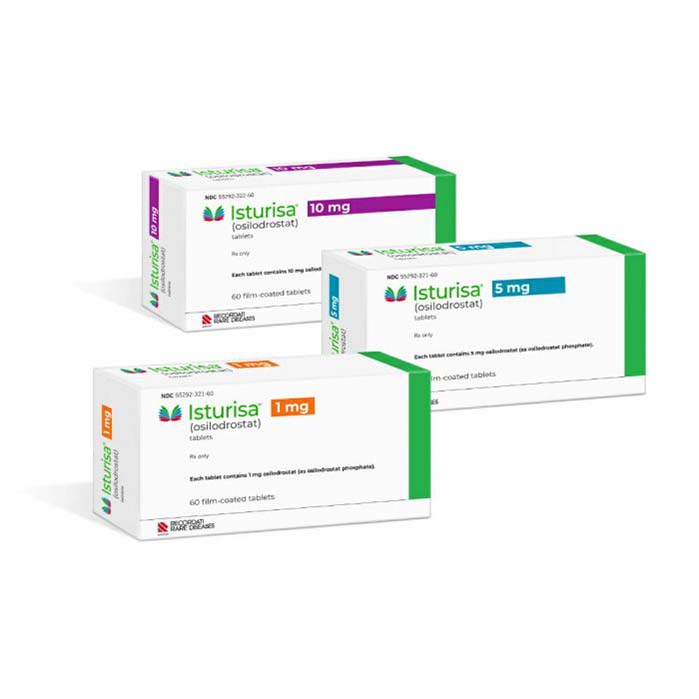
Buy Isturisa (osilodrostat) Online
Total Sales: 0
SKU: 558665
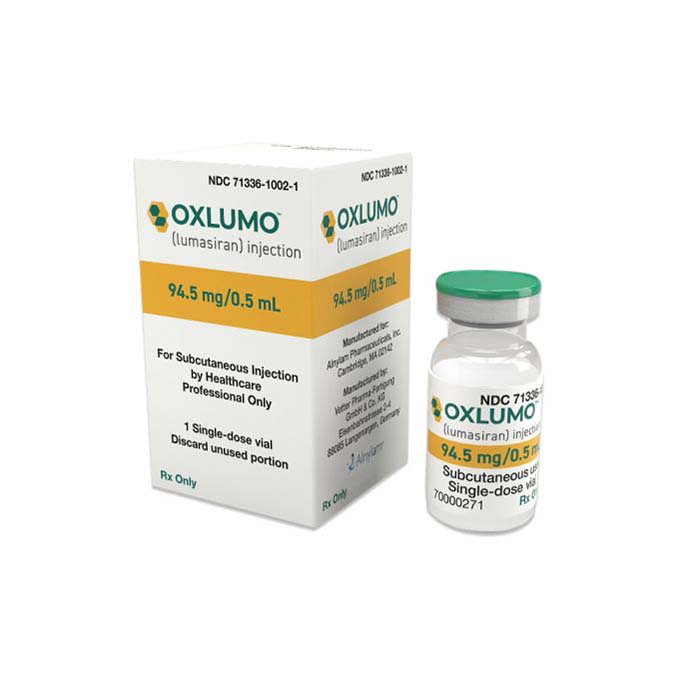
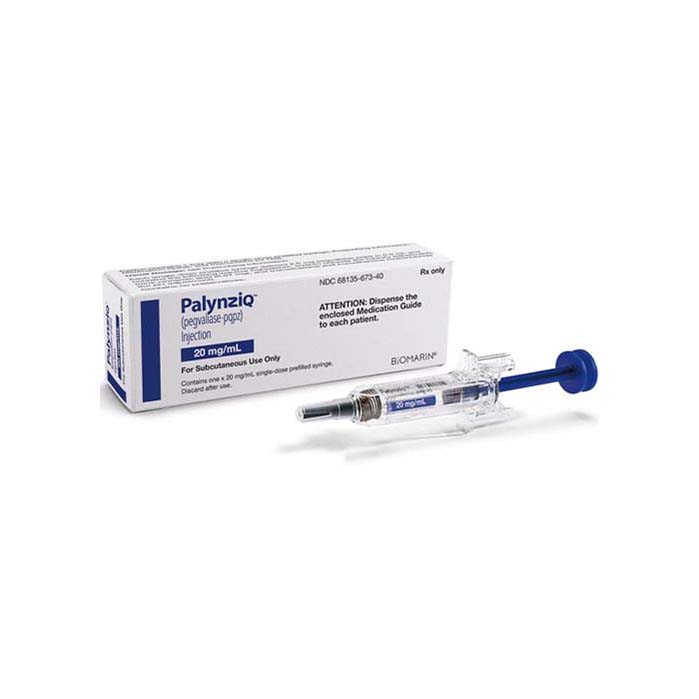
Buy Palynziq (pegvaliase-pqpz) Online
Total Sales: 0
SKU: 488525

Buy Waylivra (volanesorsen) Online
Total Sales: 0
SKU: 171924

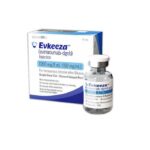
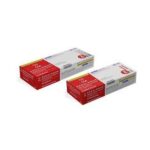
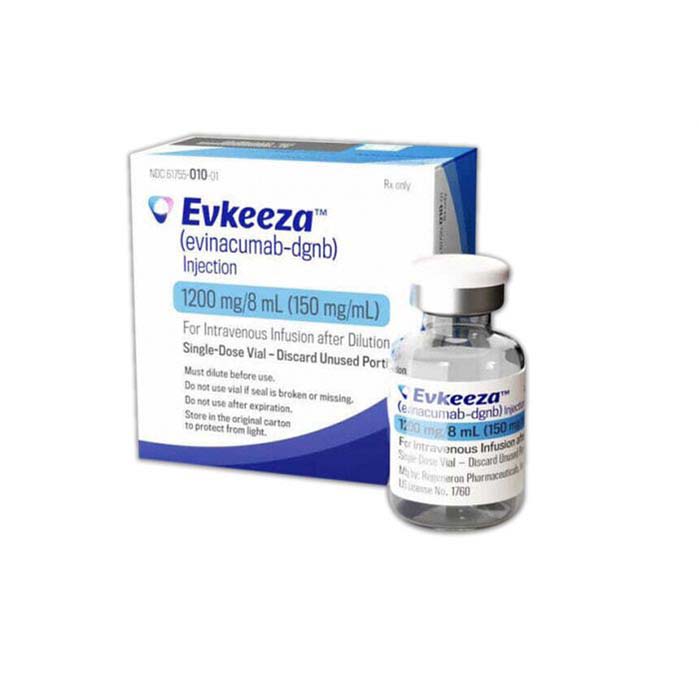
Linda Martinez –
Managing type 2 diabetes and kidney disease is tough, but Kerendia has helped me take better control. It doesn’t cause the potassium issues I had with other meds, and I’m seeing better lab results. It fits right into my routine and feels like a proactive step toward staying healthy.
Samuel Brooks –
Kerendia was recommended by my nephrologist, and I’m glad I started it. My eGFR has stabilized, and my albumin levels are lower than before. I feel good knowing this is helping protect my kidneys long-term. It’s become an important part of my daily meds.
Tracy Nguyen –
I’ve been on Kerendia for a few months now and it’s been working really well. It’s just one small pill a day, and I haven’t had any side effects. My labs are looking better, and I feel more confident managing my diabetes and kidney health with this medication.
Anthony Delgado –
Kerendia has been a great addition to my treatment plan for chronic kidney disease with type 2 diabetes. Since starting it, my blood pressure has stayed more stable and my kidney function is holding steady. My doctor said it also helps protect the heart, which gives me peace of mind. Very happy with it so far.